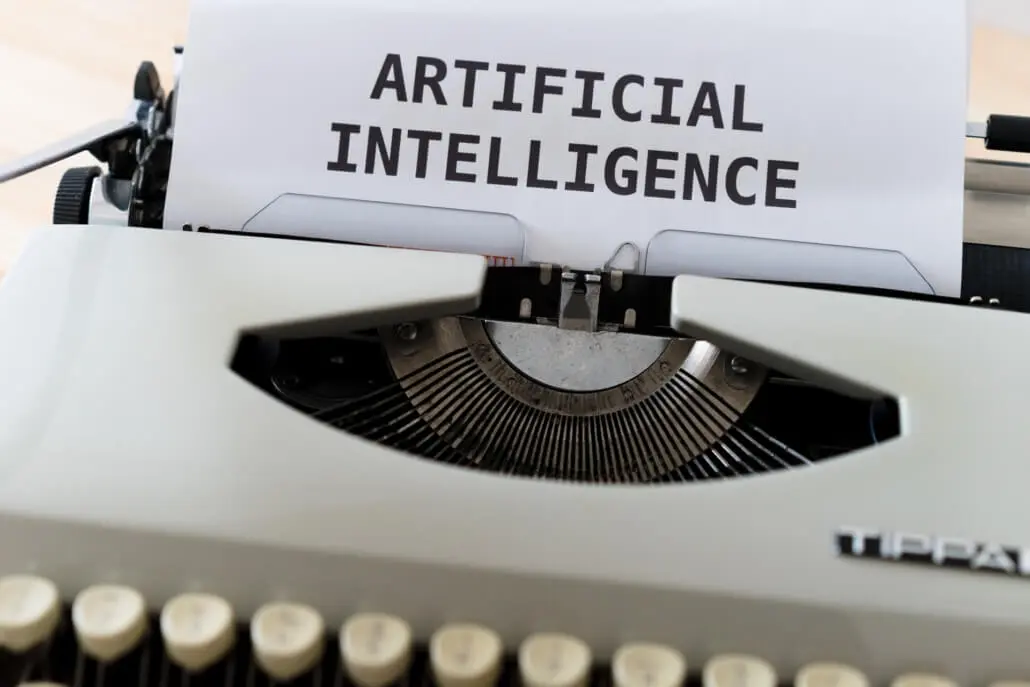Originally published July 30, 2022 , updated on April 6, 2023
Content marketing is an effective strategy for businesses to promote their products and services. But it’s getting more challenging to keep up with the information demand. Artificial intelligence (AI) in content marketing helps marketers create personalised information at scale, which is both cost-effective and time-saving.
What Is AI?
Artificial intelligence is the technology that performs intelligent tasks normally carried out by humans. Machine learning is how technology learns without humans programming the learning. The robot or computer learns from experience. AI applies technology to understand, classify, and consequently, apply information with the purpose of improving results and measuring the success thereof.
AI in Content Marketing Revolution

Customer expectations are ever-increasing. They want better quality, more engagement, faster delivery, and customisation. And businesses must find ways to meet and exceed their expectations. Likewise, digital marketers face the same challenges. Those embracing the potential of artificial intelligence tools can offer clients ways to meet customer expectations and in the same way, stay competitive in the online world. The potential includes, but is not limited to:
- Strategy development: Suggests plans and simplifies calendar development.
- Personalisation of marketing plans and engagement: Analyses behaviour and recommends information accordingly.
- Automation of the writing task: Creates email subject lines and delivers insights.
- Assists with editing: Detects errors and then suggests corrections.
- Prediction: Analysis of actions to determine the buyer’s journey stage.
- Text mining: Identifies website issues and user interaction with the information.
Let’s take a closer look at some of these to learn how it changes content marketing.
Content Strategy Development
The digital marketing agency needs to develop data-backed strategies to deliver information that engages at the right time to meet the B2B buyer’s information needs in due time. Artificial intelligence makes this process easier. Marketers benefit from platforms like HubSpot, which offers a host of inbound marketing tools to help with strategy development, and MarketMuse, with its assistant which offers remarkable insights for strategy development. See how Goodman Lantern helps with strategy development.
According to MarketMuse, marketers spend up to 19 hours on research, client brief creation, and strategy development. They also don’t have the advantage of predictable results. With artificial intelligence-driven technology, the process can take 50% less time, with more predictable results.
Source: MarketMuse
AI Content Creation

Artificial intelligence in content marketing helps to reduce workload and speed up straightforward content creation tasks. The software generates from stock and shares updates to news reports, enabling marketers to focus on strategy and complex content creation. Also, these updates on a website enhance user engagement and improve search engine results placement.
For now, the creatives are still secure in their jobs. This is only because AI content creation has not yet reached the level where the robots can perform topic and keyword research, add useful resources, write, format, edit, and suggest more topics to explore without some form of human intervention.
Artificial intelligence still lacks the emotional and intuitive aspects that set humans apart from bots. But these tools and platforms are useful to create faster, offer more value, and reduce workload.
The biggest media companies use AI to help them deliver data-driven insights. Wordsmith is a natural language generation (NLG) platform that transforms data into useful reports. Its advanced NLG for analytic algorithms delivers news reports and insights based on the data.
Many multinational corporations use Wordsmith and similar artificial intelligence-driven technology. For example, the Associated Press has been using it for years to create financial earning reports and insights.
With Wordsmith, you can upload the structured data in a normal spreadsheet and create a narrative for each row of data. Once a template is in place, it can form the base for hundreds of reports and insights written in natural language narrative.
Source: Automated Insights
Artificial Intelligence in Content Marketing for Editing
The digital marketing agency faces the challenge of delivering fresh and original information in a manner that resonates with the client’s readers. Editing tools speed up writing and editing.
Ink is a robot editor and writing tool used by brands like HubSpot, Google, and Amazon. But it’s far more than an intelligent editor tool. Ink is more like an all-in-one platform that simplifies the digital marketing agency’s writing, editing, and optimising processes.
Using the tools, the agency can create anything from catchy headlines to social media posts and also sales copy. The editing tools are easy to use and simplify tasks, like finding and removing adverbs and sticky sentences.
Source: InkforAll
Grammarly is another widely used text analysis, editing, and authoring tool that makes life easier for editors, along with the Hemingway app to create bold and concise writing.
Source: Grammarly
Chatbots to Engage with Customers

According to predictions from Servion, humans will handle only 25% of customer interactions by 2025, with chatbots managing the rest.
These tools are smart and can find answers in seconds. You might even have asked a few questions at the so-called live chat of a website without realising a machine is answering you.
Chatbots are an exciting new way to automate customer service at websites and accordingly, provide a personalised customer experience. They answer questions, solve problems, and engage the user by being interactive. Chatbots can be used for content marketing to provide timely and relevant information to your audience 24/7.
Customised News Information Delivery

The key to successful information delivery is relevance. Artificial intelligence can help with this by suggesting relevant information to the user and customising the user’s news feed.
The algorithms can learn what the user likes, dislikes, and responds to. This helps it recommend information that is most relevant to them. It also learns what they are likely to share with their friends on social media or other platforms, which helps it make more accurate suggestions for customised content feeds.
News feeds are a great way for social media platforms and websites to stay in touch with their users. This is because they are the first thing that the user sees when they log onto the site. News feeds enable the marketing team to keep users up-to-date on what is happening in their particular industry. If done right, the process increases engagement and user satisfaction.
Evaluate Lead Scores
Lead scoring is a common way of evaluating the position of leads in a buyer’s journey and also assigning them a numeric value that corresponds to their interest in a company’s product or service.
Tools can help with lead scoring by providing automation for the process and also by identifying the position of leads in a buyer’s journey. The automated process saves time for the digital content marketing agency as they don’t have to assign scores to each lead manually.
Using metrics, like the time a user spends on a website, a particular page, or an action, helps the team to predict where the user is in their buyer’s journey. This enables the agency to create and deliver information that specifically matches the user’s needs.
SalesForce offers a powerful tool to analyse each lead to determine its value, and HubSpot also offers a free lead goal calculator to help marketers identify the origin of the leads. This type of information is important to help the digital marketing agency spot issues and find the pages that lead to conversions.
Mine for Text

Text mining is a process of analysing and identifying the best keywords, issues on the site, and complaints, as well as performing text analysis, much like what Google can do.
This process can be applied to any company website or marketing campaign. Text mining is a powerful tool for marketers that can help them optimise their content for search engines and in similar fashion, audience engagement.
The main difference between AI text mining and traditional keyword research is in the way that it analyses data. It doesn’t just look at single words but instead looks at phrases and whole sentences to find out what people are interested in.
TextOptimizer is an example of how artificial intelligence in content marketing helps to gain better insight into the website’s performance issues, interests of the users and keyword strings most likely to perform well. It’s a nifty tool for finding content ideas and spotting potentially great but unused keywords on a website.
Source: Text Optimizer
In the example below, the tool retrieved a list of words related to a question on how to use a shape builder tool in AI. Using the tool, the content marketing agency is able to create in-demand information and optimise a web page or website for those keywords.
AI for Personalisation of Content Delivery
Imagine hitting the right note with every article, call-to-action, and landing page. You can use a tool like Personyze that uses over 70 visitor factors to generate landing pages to match the user’s needs so close that it’s scary.
Factors like past actions, location, website customer relationship data, industry niche, website session data, and also the visitor’s social profile come into play.
Source: Personyze
It’s only one example of how artificial intelligence in content marketing can deliver precise information for maximum lead conversions when using AI. These types of tools are now widely used to deliver dynamic landing pages for high conversion rates.
AI in Content Curation
Content curation is the process of sorting, filtering and likewise, organising information to find and deliver the most relevant information to a specific audience. The technology helps the curators to be more efficient in creating personalised information for their audiences. It provides an automated process of finding, filtering, and organising information on behalf of the marketer.
The digital marketing agency can use it for anything from getting ideas for new blog posts from other sources to generating a newsletter with curated articles from around the web in particular. The technology saves time as it does the work and finds quality information.
Scoop.it is one of the widely used curation tools. It was launched in 2011 and has since grown into a much-loved tool for finding quality information for businesses and individuals. It enables the marketer to scoop information from pages visited to curate and publish across the client’s online channels within minutes.
Source: Scoop.it
Automate Email Subject Lines for Higher Opening Rates
Email marketing, whether cold-calling or through subscription-based newsletters, still forms a cornerstone of B2B content marketing strategies. With the target audience, including business executives and marketing managers, getting them to open your emails is your way of getting a foot in the door. Tools are now available to improve open rates.
The Phrasee platform is an example. Its powerful artificial intelligence brain uses deep learning to analyse subject lines with every email sent. Hence, it helps marketers improve the subject lines to a level that guarantees that the receiver will want to open the email.
Source: Phrasee
Personalisation of email messages is at the heart of successful email marketing strategies. However, it takes the creative and marketing teams hours every week to schedule newsletters according to the segmented reader groups. Even with these efforts, the personalisation aspects are lacking.
The challenge is to deliver personalised messages to each reader, hence the need for AI tools to map readers based on their interactions with a website.
With advanced algorithms, the digital content marketing agency gains insight into each subscriber and can also deliver content in context. The tools available analyse the time an individual spends on a page, their article and blog reading history, how they interact with the website, and which case studies or white papers they download.
Will AI Content Creation Do Away with Human Input?

Artificial intelligence has become an integral part of how the world functions today. Machine learning enables people to do their jobs faster and better. Artificial intelligence is not a threat to content marketing agencies, but rather:
- Useful and supportive tools for improving workflow.
- Enhancing the understanding of client needs.
- Producing better and more personalised content.
- Driving campaigns for success.
AI in content marketing enables marketers to overcome the main challenges of:
- Consistently generating content that engages.
- Measuring the effectiveness of their efforts.
- Measuring the ROI on the marketing strategy.
- Reducing the cost and time to produce.
- Generating variety.
- Giving value.
- Meeting client expectations.
How AI and Content Marketers Can Work in Sync
Personalisation, optimal engagement with every client, and valuable information to meet client needs are all marketing objectives. With the integration of artificial intelligence in the overall marketing strategy, it’s possible to achieve these goals.
That said, it’s imperative to strike a balance. Over-personalising the interaction can seem unnatural and even lead to distrust. For the best results, work with a digital content marketing agency that uses AI where it can give you the best return on investment, improve results and help your company to gain a competitive edge in your industry niche.Partner with us at Goodman Lantern, where we make use of AI in content marketing tools to support rather than replace effective marketing initiatives. Learn more about our range of services here.
Post Views: 201



















